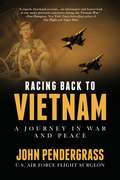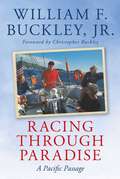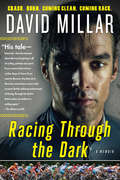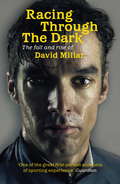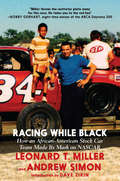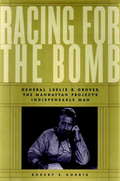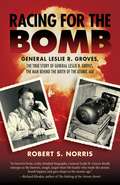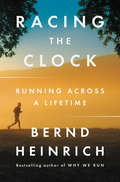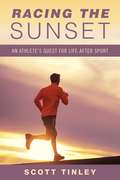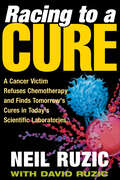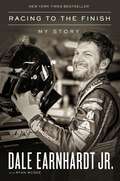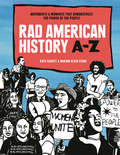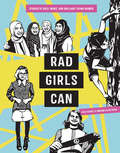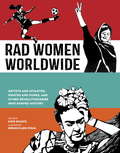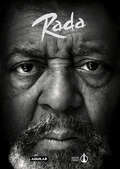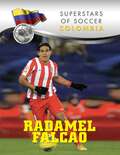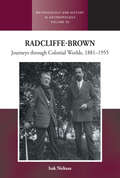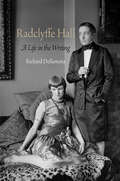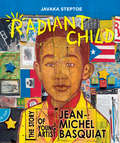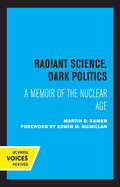- Table View
- List View
Racing Against Hate: The Story of Marshall Taylor (Fountas & Pinnell Classroom, Guided Reading Grade 6)
by Michele Spirn Chuck PyleA World Champion Cyclist In the early 1900s, Marshall Taylor was an international cycling star. But as an African-American rider competing against white riders, Taylor also had to battle prejudice while he pedaled his way to victory. NIMAC-sourced textbook
Racing Back to Vietnam: A Journey in War and Peace
by John PendergrassIn 1971, United Air Force flight surgeon John Pendergrass spent much of his time in the backseat of an F-4 Phantom, racing across the skies of Vietnam. Forty-five years later, he boards an altogether different type of aircraft and heads back to Vietnam for an altogether different kind of race—an IRONMAN® triathlon. A veteran of IRONMAN triathlons on six continents, Racing Back to Vietnam follows John’s year in combat and his return to Vietnam, revisiting a country that, for him, is bound up in history, memory and emotion. A memoir of war as seen from the skies and a reflection on life’s high adventure, John tries to reconcile the Vietnam he saw from the backseat of a fighter jet with today’s modern Vietnam. Thought-provoking, heartfelt and gripping, Racing Back to Vietnam is one man’s trip back through time on a journey of rediscovery.
Racing Through Paradise: A Pacific Passage
by William F. Buckley Jr.Racing Through Paradise is the third entry in Bill Buckley&’s now classic sailing trilogy.Here the irresponsible, eloquent, enjoyable Buckley guides us through his beloved Azores, and through the Galapagos (&“the Bronx Zoo at the Equator&”), about which he inclines more to Melville&’s view than to Darwin&’s, and through places such as Johnston Atoll, where mysteries and hostilities await. On a hilarious side adventure, we have a memorable encounter with &“The Angel of Craig&’s Point.&” Along the way, Buckley navigates among pleasant diversions as well as unforeseen navigational and philosophical shoals. He adroitly excerpts the candid journals of his shipmates, notably that of his son, Christopher, himself a best-selling novelist. The fine photographs by Christopher Little illustrate throughout. When Buckley&’s Sealestial sails, finally, into New Guinea, we have shared a unique experience with a special breed of sailor, skipper, host, friend, and human being.
Racing Through the Dark
by David MillarWORLD-CLASS CYCLIST, Tour de France stage winner, and time trial specialist David Millar offers a vivid portrait of his life in professional cycling--including his soul-searing detour into performance-enhancing drugs, his dramatic arrest and two-year ban, and his ultimate decision to return to the sport he loves to race clean--in this arrestingly candid memoir, which he wrote himself. As a young Scottish expat living in Hong Kong with his father after his parents' divorce, Millar showed early promise with mountain biking and BMX. Two wise local cyclists took him under their wings, encouraging him to concentrate on road racing. Millar proved a ready convert. Racing Through the Dark offers the winning account of his climb through the ranks--first as an amateur and then as a pro, riding for the French team Cofidis. Among his early triumphs were several stage wins in the Tour de France. From the moment Millar turned pro, he began to see hints of the unethical measures that many-- maybe most--of the other pros were taking in order to race at the very tops of their games . . . and beyond. At first, he felt that he was immune to temptation, that he could win clean. But the ugly pervasiveness of performance-enhancing drugs and the seemingly universal attitude that condoned it began to corrode his willpower. Racing Through the Dark details his eventual capitulation, his subsequent arrest and two-year ban from cycling, and his remarkable comeback as a clean cyclist who is now doing his utmost to keep performance-enhancing drugs out of the sport he so loves. Filled with thrilling descriptions of the world's most spectacular courses, Racing Through the Dark captures the pure joy of cycling and includes some of the most vivid accounts of racing ever written by a true insider.
Racing Through the Dark: The Fall and Rise of David Millar
by David MillarBy his eighteenth birthday David Millar was living and racing in France, sleeping in rented rooms, tipped to be the next English-speaking Tour winner. A year later he'd realised the dream and signed a professional contract. He perhaps lived the high life a little too enthusiastically - he broke his heel in a fall from a roof after too much drink - and before long the pressure to succeed had tipped over into doping. Here, in a full and frank autobiography, David Millar recounts the story from the inside: he doped because 'cycling's drug culture was like white noise', and because of peer pressure. 'I doped for money and glory in order to guarantee the continuation of my status.' Five years on from his arrest, Millar is clean and reflective, and holds nothing back in this account of his dark years.
Racing Through the Dark: The Fall and Rise of David Millar
by David MillarBy his eighteenth birthday David Millar was living and racing in France, sleeping in rented rooms, tipped to be the next English-speaking Tour winner. A year later he'd realised the dream and signed a professional contract. He perhaps lived the high life a little too enthusiastically - he broke his heel in a fall from a roof after too much drink - and before long the pressure to succeed had tipped over into doping. Here, in a full and frank autobiography, David Millar recounts the story from the inside: he doped because 'cycling's drug culture was like white noise', and because of peer pressure. 'I doped for money and glory in order to guarantee the continuation of my status.' Five years on from his arrest, Millar is clean and reflective, and holds nothing back in this account of his dark years.
Racing Uphill: Confronting a Life with Epilepsy
by Stacia KalinoskiThe candid, inspiring story of a woman&’s experience with a chronic, unpredictable neurological condition When twenty-nine-year-old reporter Stacia Kalinoski regained consciousness on a couch at the TV station where she worked, she assumed that she&’d had another seizure. But the electrical storm that had just torn through her brain was more destructive than she could have imagined, and the broadcast journalism career she loved swiftly came to an end. Forced to confront the reality of her medical condition, Kalinoski made the risky decision to undergo brain surgery, targeting the epilepsy that was ravaging her life. In Racing Uphill, Kalinoski describes the seizures that occurred while she was running, which led to her pursuit of an uncertain cure. Rallying the grit she developed as an athlete and engaging the research and reporting skills she acquired as a journalist, she gives us a rare inside look at the ways epilepsy can change a life. Moving beyond her own personal experience, Kalinoski interviews prominent epileptologists to understand how seizures can spread, steal memories, and create strange behaviors and mood disorders. She seamlessly joins what she learned from her research with her own story, offering valuable insight into the experience of grappling with a relentless neurological disease. The vivid auras that preceded seizures and the damage that followed; the toll of her epilepsy on her family and loved ones; the extraordinary determination her reckoning required—these are all part of Kalinoski&’s story of adversity, denial, acceptance, and resilience. In sharing the remarkable opportunity that epilepsy presented for her courage and growth, Stacia Kalinoski speaks to anyone facing an uphill battle and offers inspiration for taking control of one&’s own health.
Racing While Black: How an African-American Stock Car Team Made Its Mark on NASCAR
by Andrew Simon Leonard T. Miller Kenneth L. ShropshireStarting a NASCAR team is hard work. Starting a NASCAR team as an African American is even harder. These are just a few of the lessons learned by Leonard T. Miller during his decade and a half of running an auto racing program. Fueled by more than the desire to win, Miller made it his goal to create opportunities for black drivers in the vastly white, Southern world of NASCAR. Racing While Black chronicles the travails of selling marketing plans to skeptics and scraping by on the thinnest of budgets, as well as the triumphs of speeding to victory and changing the way racing fans view skin color. With his father--former drag racer and longtime team owner Leonard W. Miller--along for the ride, Miller journeys from the short tracks of the Carolinas to the boardrooms of the "Big Three" automakers to find out that his toughest race may be winning over the human race.
Racing for the Bomb: General Leslie R. Groves, the Manhattan Project's Indispensable Man
by Robert S. NorrisNorris (research associate, Natural Resources Defense Council) celebrates the life of General Groves (1896-1970), whom he considers to have the dubious distinction of being the indispensable person in the building of the atomic bomb and the critical person in determining how, when, and where it was used in Japan. Despite the book's title, a significant amount of the material focuses on Groves' youth, education, and early career before he was tapped to head the Manhattan project. Further material discusses his later involvement with the politics of nuclear arms after the close of World War II. Groves' overwhelming influence in the Manhattan project, Norris feels, was also instrumental in building the national security state that has continued to characterize the post-war years. Annotation c. Book News, Inc. , Portland, OR (booknews. com)
Racing for the Bomb: The True Story of General Leslie R. Groves, the Man behind the Birth of the Atomic Age
by Robert S. NorrisIn September 1942, Colonel Leslie R. Groves was given the job of building the atomic bomb. As a career officer in the Army Corps of Engineers, Groves had overseen hundreds of military construction projects, including the Pentagon. Until now, scientists have received the credit for the Manhattan Project's remarkable achievements. And yet, it was Leslie R. Groves who made things happen. It was Groves who drove manufacturers, construction crews, scientists, industrialists, and military and civilian officials to come up with the money, the materials, and the plans to solve thousands of problems and build the bomb in only two years. It was his operation, and in Racing for the Bomb he emerges as a take-charge, can-do figure who succeeds in the face of formidable odds.Revealed for the first time in Racing for the Bomb, Groves played a crucial and decisive role in the planning, timing, and targeting of the Hiroshima and Nagasaki missions. Norris offers new insights into the complex and controversial questions surrounding the decision to drop the bomb in Japan and Groves's actions during World War II, which had a lasting imprint on the nuclear age and the Cold War that followed.Grove's extensive influence on key institutions of postwar America has been overlooked for too long. In this full-scale biography, which includes archival material and family letters and documents and features several previously unpublished photographs, Norris places Groves at the center of the amazing Manhattan Project story.
Racing the Clock: Running Across a Lifetime
by Bernd HeinrichAn award-winning, much-loved biologist turns his gaze on himself, using his long-distance running to illuminate the changes to a human body over a lifetimePart memoir, part scientific investigation, Racing the Clock is the book biologist and natural historian Bernd Heinrich has been waiting his entire life to write. A dedicated and accomplished marathon (and ultra-marathon) runner who won his first marathon at age thirty-nine, Heinrich looks deeply at running, aging, and the body, exploring the unresolved relationship between metabolism, diet, exercise, and age. Why do some bodies age differently than others? How much control do we have over that process and what effect, if any, does being active have? Bringing to bear research from his entire career and in the spirit of his classic Why We Run, Heinrich probes the questions of how we use energy and continue to adapt to our mutable surroundings and circumstances. Beyond that, he examines how our bodies change while we age but also how we can work with, if not overcome, many of these changes—and what all this tells us about evolution and the mechanisms of life, health, and happiness.Racing the Clock offers fascinating and surprising conclusions, all while bringing the reader along on Heinrich’s compelling journey to what he says will be his final race—a fifty-kilometer race at age eighty.
Racing the Sunset: How Athletes Survive, Thrive, or Fail in Life After Sport (Lyons Press Ser.)
by Scott TinleyA seventh-generation Californian, Scott Tinley led the quintessential Golden State dream. As he grew from beach rat to lifeguard to a recreational administration major, it seemed only natural to him that he would try to parlay the athletic skills gleaned from this idyllic lifestyle into a profession as one of the best triathletes in the world. For twenty years, his skill, tenacity, and devil-may-care attitude guided him along the path. But when age took hold of his legs, and no amount of training would help, his athletic gold rush went bust. Cracks in his psyche began to show, as if beneath it all--like much of California itself--his athletic life had been built on a fault. Always introspective and inquiring, Tinley threw himself headlong into athlete retirement and the larger issues of life transition and change. His new journey, driven by his quest for personal growth and healing, was filled with pain, false starts, and heartrending intimacies. It led him to hundreds of other retired professional athletes who would openly discuss their own triumphs and tragedies. With much discipline, Tinley completed one of the most thorough athlete research projects ever attempted, and befriended such superstars as Bill Walton, Eric Heiden, Greg LeMond, Jerry Sherk, Steve Scott, and Rick Sutcliffe. Along the way he uncovered secrets about himself and the process of change, turmoil, and final acceptance, all shared openly and eloquently in Racing the Sunset. This book will do for athletes of every level what Passages did for an entire generation.
Racing to a Cure: A Cancer Victim Refuses Chemotherapy and Finds Tomorrow's Cures in Today's Scientific Laboratories
by Neil RuzicRacing to a Cure is not a cancer memoir. It is a cancer cure memoir. In 1998 Neil Ruzic was diagnosed with mantle-cell lymphoma, the deadliest cancer of the lymph system, whose spread is reaching epidemic levels in the U.S. and Europe. Instead of following recommended courses of chemotherapy and radiation, he took control of his treatment by investigating cures being developed in the nation's cancer-research laboratories. Although chemotherapy harms the immune system and is increasingly demonstrated to be an ineffective long-term cure for the vast majority of cancers, it remains the standard treatment for most cancer patients. Ruzic, a former scientific magazine publisher and originator of a science center, refused to accept this status quo, and instead plunged into the world of cutting-edge treatments, exploring the frontiers of cancer science with revolutionary results. Ruzic went on the offensive: visiting scores of laboratories, gathering information, talking to researchers, and effectively becoming his own patient-care advocate. This book presents his findings. A scathing critique of the chemotherapy culture as well as unscientific "alternative" therapies, the book endorses state-of-the-art molecularly based technologies, making it an illuminating and necessary read for anyone interested in cancer research, especially patients and their families and physicians. Neil Ruzic was expected to die within two years of his initial diagnosis. Five years later he has been declared cancer-free and considers himself cured.
Racing to the Finish: My Story
by Dale Earnhardt Jr. Ryan McGee“My book … details the living hell that was my experience with concussions. The majority of this story was kept from even my closest relationships. It wasn’t easy, but it’s time to tell it.” – Dale Jr. <p><p>It was a seemingly minor crash at Michigan International Speedway in June 2016 that ended the day early for Dale Earnhardt Jr. What he didn’t know was that it would also end his driving for the year. He’d dealt with concussions before, but concussions are like snowflakes—no two are the same. And recovery can be brutal—and lengthy. <p><p>As a third-generation driver in a family forever connected to the sport of stock-car racing, how could Dale Earnhardt Jr. sit on the sidelines and watch everyone else take their laps? <p><p> It was one of the toughest seasons of his life—one that changed him forever.In this gripping narrative from one of professional sports’ most beloved figures, Dale Jr. shares stories from his journey: how his career and his injury have transformed him, how he made the decision to retire at the end of the 2017 season after eighteen years behind the wheel, and what lies ahead for him in the next chapter of his life. <p><p>There’s no second-guessing and no regrets from Driver #88. He simply wants to go out on his own terms and make the rest of his life off the racetrack count. Junior says, “I don’t want these last races to be just about me but rather the people who made my success possible: my fans, the folks who pack the grandstands rain or shine, my teammates and crew members through the years, industry colleagues, track volunteers, friends, family, sponsors. They’ve all played a role. I couldn’t have done it without them.” <P><b>A New York Times Bestseller</b>
Rad American History A-Z: Movements and Moments That Demonstrate the Power of the People (Rad Women)
by Kate SchatzFrom the New York Times bestselling team behind Rad American Women A-Z comes an illustrated collection of radical and transformative political, social, and cultural movements in American history.&“An engaging, fascinating, and necessary book that speaks truth to power.&”—Congresswoman Barbara LeeIn Rad American History A-Z, each letter of the alphabet tells the story of a significant moment in America's progressive history--one that isn't always covered in history classes: A is for Alcatraz, and the Native occupation of 1969; C is for the Combahee River Raid, a Civil War action planned in part by Union spy Harriet Tubman; Z is for Zuccotti Park, and the Occupy movement that briefly took over the world. Paired with dynamic paper-cut art by Miriam Klein Stahl, the entries by Kate Schatz explore several centuries of politics, culture, art, activism, and liberation, including radical librarians, Supreme Court cases, courageous youth, punk rocker grrrls, Southern quilts, and modern witches. In addition to the twenty-six core stories, short sidebars expand the discussion, and dictionary-style lists refer readers to additional key moments. So while F is for Federal Theater Project, a New Deal-era program that employed thousands of artists, F is also for Freedom Rides and First Amendment. E is for Earth First!, but also for Endangered Species Act and Equal Rights Amendment. There are tales of triumph, resilience, creation, and hope. Each engaging, fact-filled narrative illustrates an eye-opening moment that shows us how we got to now--and what we need to know about our histories to create a just and sustainable future.Advance praise for Rad American History A-Z&“I wish I&’d had Rad American History A–Z when I was growing up; it&’s a book I hope to read to my children one day. In such chaotic political times, this is a critical tool for young people to know how change happens, and to know that they, too, can make change happen. This book belongs on all library shelves as a transformative approach to history as we know it.&”–Alicia Garza, cofounder of Black Lives Matter Global Network
Rad Girls Can: Stories of Bold, Brave, and Brilliant Young Women (Rad Women)
by Kate Schatz Miriam Klein StahlFrom the New York Times best-selling authors of Rad Women Worldwide and Rad American Women A-Z, a bold and brave collection of stories and art about inspiring and accomplished girls who have made positive impacts on the world before the age of 20. <P><P>You might know the stories of Malala Yousafzai, Anne Frank, Jazz Jennings, and Joan of Arc. <P><P>But have you heard about Yusra Mardini, a Syrian refugee who swam a sinking boat to shore, saved twenty lives, then went on to compete as an Olympic swimmer? Or Trisha Prabhu, who invented an anti-cyberbullying app at age 13? Or Barbara Rose Johns, whose high school protest helped spark the civil rights movement? <P><P>In Rad Girls Can, you'll learn about a diverse group of young women who are living rad lives, whether excelling in male-dominated sports like boxing, rock climbing, or skateboarding; speaking out against injustice and discrimination; expressing themselves through dance, writing, and music; or advocating for girls around the world. Each profile is paired with the dynamic paper-cut art that made the authors' first two books New York Times best sellers. <P><P>Featuring both contemporary and historical figures, Rad Girls Can offers hope, inspiration, and motivation to readers of all ages and genders.
Rad Women Worldwide: Artists and Athletes, Pirates and Punks, and Other Revolutionaries Who Shaped History (Rad Women)
by Kate Schatz Miriam Klein StahlFrom the authors of the New York Times bestselling book Rad American Women A-Z, comes a bold new collection of 40 biographical profiles, each accompanied by a striking illustrated portrait, showcasing extraordinary women from around the world.Rad Women Worldwide tells fresh, engaging, and inspiring tales of perseverance and radical success by pairing well researched and riveting biographies with powerful and expressive cut-paper portraits. From 430 BCE to 2016, spanning 31 countries around the world, the book features an array of diverse figures, including Hatshepsut (the great female king who ruled Egypt peacefully for two decades) and Malala Yousafzi (the youngest person to win the Nobel Peace Prize) to Poly Styrene (legendary teenage punk and lead singer of X-Ray Spex) and Liv Arnesen and Ann Bancroft (polar explorers and the first women to cross Antarctica). This progressive and visually arresting book is a compelling addition to women's history and belongs on the shelf of every school, library, and home. Together, these stories show the immense range of what women have done and can do. May we all have the courage to be rad!From the Hardcover edition.
Rada
by Rubén RadaEs la vida del Negro Rada, susilusiones, éxitos, desencuentros, caídas y resurrecciones.Unsorprendente resumen de gran parte de la biografía musical uruguaya yargentina de los últimos sesenta años.La música popularrioplatense sigue teniendo en Ruben Rada a una de sus figuras mástalentosas, originales, carismáticas e influyentes. Showman innato, departicular sentido del humor, es también considerado uno de los pionerosen la gestación del territorio sonoro que mezcla el candombe con elrock, el jazz y otros estilos. En colaboración con elinvestigador y escritor Fernando Peláez, Rada expresa en este libro suadmiración por los músicos y músicas que amó y lo inspiraron, así comopor aquellos colegas con los que tanto compartió durante las diferentesetapas de su trayectoria.Desde su niñez vivida en la pobrezaeconómica, los recuerdos y anécdotas aquí rescatados recorren una vidaplena de ilusiones, éxitos, desencuentros, viajes, caídas,resurrecciones y un notable instinto para alcanzar la libertad de acciónnecesaria para un creador.Además, casi sin proponérselo, Rada yPeláez terminan relatando, de manera extremadamente clara y sencilla, unsorprendente resumen de buena parte de la biografía musical uruguaya yargentina de los últimos sesenta años. Es la vida del Negro Rada, susilusiones, éxitos, desencuentros, caídas y resurrecciones.Unsorprendente resumen de gran parte de la biografía musical uruguaya yargentina de los últimos sesenta años.La música popularrioplatense sigue teniendo en Ruben Rada a una de sus figuras mástalentosas, originales, carismáticas e influyentes. Showman innato, departicular sentido del humor, es también considerado uno de los pionerosen la gestación del territorio sonoro que mezcla el candombe con elrock, el jazz y otros estilos. En colaboración con elinvestigador y escritor Fernando Peláez, Rada expresa en este libro suadmiración por los músicos y músicas que amó y lo inspiraron, así comopor aquellos colegas con los que tanto compartió durante las diferentesetapas de su trayectoria.Desde su niñez vivida en la pobrezaeconómica, los recuerdos y anécdotas aquí rescatados recorren una vidaplena de ilusiones, éxitos, desencuentros, viajes, caídas,resurrecciones y un notable instinto para alcanzar la libertad de acciónnecesaria para un creador.Además, casi sin proponérselo, Rada yPeláez terminan relatando, de manera extremadamente clara y sencilla, unsorprendente resumen de buena parte de la biografía musical uruguaya yargentina de los últimos sesenta años.
Radamel Falcao (Superstars of Soccer SPANISH)
by Elizabeth Levy SadGoleador profesional desde los 13 años, Radamel Falcao García es uno de los grandes del fútbol que forjó una carrera estelar a costa de un enorme sacrificio. Su gran disciplina y su serena fortaleza lo instalaron desde muy joven en las ligas mayores; primero, en su Colombia natal; luego en la Argentina, y actualmente, en la Liga de las Estrellas, en la que deslumbra batiendo sus propios récords como goleador implacable. Para llegar al más alto nivel profesional, tuvo que atravesar una difícil etapa lejos de su familia: hipotecó su adolescencia para cumplir un sueño. Actualmente, deslumbra en el Atlético Madrid, y es el jugador colombiano mejor cotizado de la historia. Su velocidad y su definición impecable, le hacen justicia a su apodo: es un verdadero "Tigre".
Radamel Falcao (Superstars of Soccer)
by Elizabeth Levy SadGoleador profesional desde los 13 años, Radamel Falcao García es uno de los grandes del fútbol que forjó una carrera estelar a costa de un enorme sacrificio. Su gran disciplina y su serena fortaleza lo instalaron desde muy joven en las ligas mayores; primero, en su Colombia natal; luego en la Argentina, y actualmente, en la Liga de las Estrellas, en la que deslumbra batiendo sus propios récords como goleador implacable. Para llegar al más alto nivel profesional, tuvo que atravesar una difícil etapa lejos de su familia: hipotecó su adolescencia para cumplir un sueño. Actualmente, deslumbra en el Atlético Madrid, y es el jugador colombiano mejor cotizado de la historia. Su velocidad y su definición impecable, le hacen justicia a su apodo: es un verdadero "Tigre".
Radcliffe-Brown: Journeys Through Colonial Worlds, 1881-1955 (Methodology & History in Anthropology #50)
by Isak NiehausAlfred Radcliffe-Brown (1881-1955) is widely renowned as a founder of modern social anthropology. This biography challenges popular stereotypes of him as a misplaced positivist and colonial conservative. It shows Radcliffe-Brown to be a thoroughly cosmopolitan scholar, a committed fieldworker and a sharp critic of colonialism. Radcliffe-Brown engaged strategically with colonial authorities to further the interests of his discipline and invoked scientific credentials to critique central aspects of colonial rule. His struggle for intellectual autonomy and advocacy of a comparative sociological approach speaks to many contemporary concerns.
Radclyffe Hall: A Life in the Writing
by Richard DellamoraThe Well of Loneliness is probably the most famous lesbian novel ever written, and certainly the most widely read. It contains no explicit sex scenes, yet in 1928, the year in which the novel was published, it was deemed obscene in a British court of law for its defense of sexual inversion and was forbidden for sale or import into England. Its author, Radclyffe Hall, was already well-known as a writer and West End celebrity, but the fame and notoriety of that one book has all but eclipsed a literary output of some half-dozen other novels and several volumes of poetry.In Radclyffe Hall: A Life in the Writing Richard Dellamora offers the first full look at the entire range of Hall's published and unpublished works of fiction, poetry, and autobiography and reads through them to demonstrate how she continually played with the details of her own life to help fashion her own identity as well as to bring into existence a public lesbian culture. Along the way, Dellamora revises many of the truisms about Hall that had their origins in the memoirs of her long-term partner, Una Troubridge, and that have found an afterlife in the writings of Hall's biographers.In detailing Hall's explorations of the self, Dellamora is the first seriously to consider their contexts in Freudian psychoanalysis as understood in England in the 1920s. As important, he uncovers Hall's involvement with other modes of speculative psychology, including Spiritualism, Theosophy, and an eclectic brand of Christian and Buddhist mysticism. Dellamora's Hall is a woman of complex accommodations, able to reconcile her marriage to Troubridge with her passionate affairs with other women, and her experimental approach to gender and sexuality with her conservative politics and Catholicism. She is, above all, a thinker continually inventive about the connections between selfhood and desire, a figure who has much to contribute to our own efforts to understand transgendered and transsexual existence today.
Radhanath Ray
by Gopinath MohantyRadhanath Ray (1848-1908) came of a Bengali family that had settled in Orissa for generations. His kavyas set up a new tradition in Oriya poetry and influenced subsequent poets almost up to the middle of the 20th century.
Radiant Child: The Story of Young Artist Jean-Michel Basquiat
by Javaka SteptoeA visually stunning picture book biography about modern art phenomenon Jean-Michel Basquiat, written and illustrated by Coretta Scott King Award winner Javaka Steptoe.<P><P> Jean-Michael Basquiat and his unique, collage-style paintings rocketed to fame in the 1980s as a cultural phenomenon unlike anything the art world had ever seen. But before that, he was a little boy who saw art everywhere: in poetry books and museums, in games and in the words that we speak, and in the pulsing energy of New York City. Now, award-winning illustrator Javaka Steptoe's vivid text and bold artwork echoing Basquiat's own introduce young readers to the powerful message that art doesn't always have to be neat or clean--and definitely not inside the lines--to be beautiful.<P> Winner of the Caldecott Medal
Radiant Science, Dark Politics: A Memoir of the Nuclear Age
by Martin D. KamenThis title is part of UC Press's Voices Revived program, which commemorates University of California Press’s mission to seek out and cultivate the brightest minds and give them voice, reach, and impact. Drawing on a backlist dating to 1893, Voices Revived makes high-quality, peer-reviewed scholarship accessible once again using print-on-demand technology. This title was originally published in 1985.

